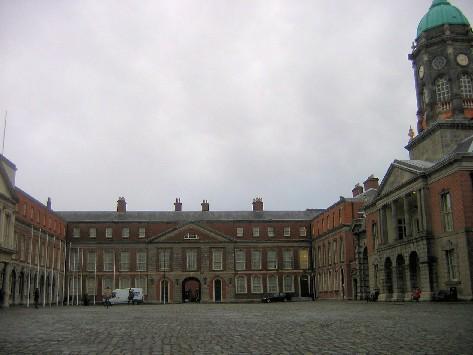Shadow cast over Flood Tribunal

Adrian Hardiman's recent judgement raises uncomfortable questions for the Flood Tribunal. By Vincent Browne.
When the second interim report of the Planning Tribunal (the main report) was published in September 2002, it went on sale for €1, and was an immediate bestseller.
Mr Justice Feargus Flood was an instant hero. He had undone one of Fianna Fáil’s most arrogant and crooked ministers, Ray Burke; had uncovered a circle of corrupt developers and businessmen; and had done so without fear or favour. The story goes that, as he strolled down Grafton Street a few days before Christmas 2002, the crowds parted and applauded the great man.
But, even then, it should have been clear to any reader of the report that it included dodgy bits.
(Picture: Dublin Castle)
Many of us wondered about one aspect in particular. It concerned the famous visit by James Gogarty and others to the home of Ray Burke, the then minister for industry and commerce, on June 15,1989.
That meeting was etched on the minds of those of us who followed the proceedings of the Flood Tribunal (as it then was) because of a vivid phrase used by Gogarty in his account of the journey to Burke’s home in Swords.
As Gogarty was being driven there that morning by builder Mick Bailey, he asked Bailey whether they would get a receipt from Burke for the money they were about to hand him. Bailey replied: ‘‘Will we fuck.” (For the benefit of those unfamiliar with the use of that expression in such circumstances, it suggested that Burke was unlikely to proffer a receipt.)
Gogarty (who was then working for construction firm JSME) claimed that, with him in Bailey’s car that morning and later in Burke’s home was Joseph Murphy Jnr (also of JSME).Three of the four people at the meeting that morning stated categorically that Murphy was not there. Only Gogarty insisted he was.
Murphy was able to show evidence that he was in London on June 15,1989. In spite of this, Flood concluded he was in Burke’s house that morning because he could have flown back to Dublin and then returned to London within hours. Flood decided that Gogarty’s evidence was so conclusive that he could disregard the evidence of Burke, Bailey and Murphy.
The credibility that Flood attached to Gogarty’s evidence was surprising, since Flood was aware that, in private, Gogarty had made wild allegations against another senior politician and several businessmen that, on the face of it, seemed implausible. These seemed to cast doubt on Gogarty’s general credibility.
A further dimension to this was highlighted by Adrian Hardiman’s judgment in the Supreme Court last Wednesday in a case taken by Murphy and others in relation to their tribunal costs. The tribunal withheld from Burke and the others against whom Gogarty gave evidence, part of the transcript of the conversation which recorded Gogarty making these extravagant allegations.
The curious aspect of this was that this decision to blank out the wild allegations, which would have cast doubt on Gogarty’s credibility, was taken after the High Court had decided that the withholding of such evidence in another matter to do with the tribunal was wrong.
Hardiman said: ‘‘I find this very disturbing.” Last Wednesday’s judgment must have been disturbing to many people.
Hardiman’s analysis of the evidence was very critical, and calls into question much of the second interim report, which was received so rapturously, including many of the findings against Burke and others.
But, more than that, it found that the basis on which the tribunal, now under its new chairman Alan Mahon, refused costs to Murphy and others was wrong. The tribunal refused costs on the grounds that it had found the applicants for costs guilty of wrongdoing. But, according to the Supreme Court, this amounted to the imposition of a penalty.
The court also found that the basis on which costs were refused - because the tribunal found Murphy and others guilty of obstructing and hindering the tribunal - was invalid. It said that, just because the tribunal came to a conclusion different from the evidence of a witness, that did not in itself justify a finding of obstructing and hindering.
This has enormous implications, because many witnesses - including Burke, Tom Brennan, Joseph McGowan, John Finnegan, Oliver Barry, James Stafford, Joseph Murphy Snr, Joseph Murphy Jnr, Mick, Tom and Caroline Bailey - were all found to have obstructed and hindered the tribunal, largely because their evidence was rejected by the tribunal.
There is at least a possibility that all of them - and possibly many other people - will now have to be awarded their legal costs, which will run into hundreds of millions of euro.
But, nowadays, who cares about mere hundreds of millions?
